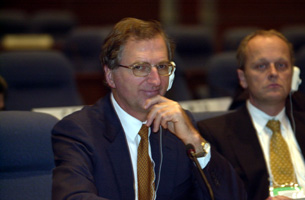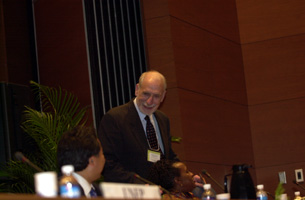|
Fourth
Meeting of the Open-ended Intergovernmental Group of Ministers or
their Representatives on International Environmental Governance
|
||
|
|
||
|
|
|
| WORKING GROUP I | |
|
|
|
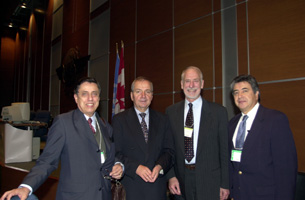 Colombia reminded the Chair that delegations could not progress beyond the mandates received from their capitals, and invited the Secretariat to seek a refinement of the advice on the legal status of the GMEF. Right photo: Colombian delegation with Klaus Töpfer, UNEP Executive Director and Minister David Anderson (CANADA) |
|
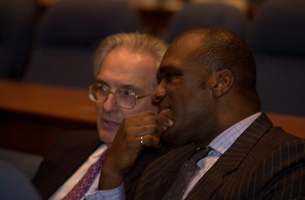 Canada, the EU, and Antigua and Barbuda (far right with Patrick Szell, UK) welcomed Norway's proposals on an intergovernmental panel for assessing global environmental change (UNEP/IGM/4/CRP.1), and a strategic plan of action for implementation support (UNEP/IGM/4/CRP.2). |
|
| WORKING GROUP II | |
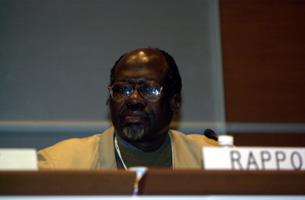 Chair Miyingo (right) summarized Working Group II's discussions on improved coordination and coherence between MEAs, capacity building, technology transfer and country-level coordination, and the role of the EMG. He noted that good progress had been made, and that a revised Chair's text (UNEP/IGM/4/CRP.3), based on the President's Proposals and the discussions of the working group had been agreed. |
|
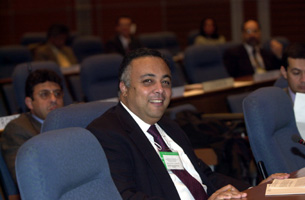 Egypt, on behalf of the G-77/China, emphasized that back-to-back meetings are inappropriate because they are too long and draw on different constituencies at the national level. |
|
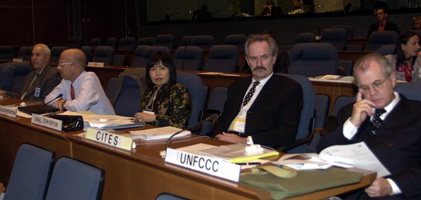 The
UN Framework Convention on Climate Change Secretariat supported the idea of
pilot clustering, but said it is not appropriate in all circumstances, noted
that functional clustering raises issues of accountability, and highlighted
the impracticality of clustering approaches to compliance monitoring. Basel
Convention on the Control of Transboundary Movements of Hazardous Wastes and
their Disposal described its experience with clustering activities of mutual
interest with the Stockholm Convention on Persistent Organic Pollutants (POPs)
and the Rotterdam Convention on Prior Informed Consent (PIC). The
UN Framework Convention on Climate Change Secretariat supported the idea of
pilot clustering, but said it is not appropriate in all circumstances, noted
that functional clustering raises issues of accountability, and highlighted
the impracticality of clustering approaches to compliance monitoring. Basel
Convention on the Control of Transboundary Movements of Hazardous Wastes and
their Disposal described its experience with clustering activities of mutual
interest with the Stockholm Convention on Persistent Organic Pollutants (POPs)
and the Rotterdam Convention on Prior Informed Consent (PIC).
|
|
|
WORKING GROUP ON FINANCING FOR UNEP : |
|
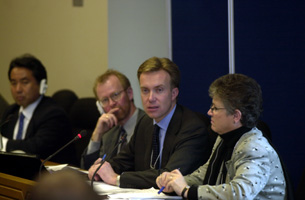 Chair
Brende (second from right) summarized the progress of the working group on
strengthening the role, authority, and financial situation of UNEP. He noted
general agreement that UN General Assembly Resolution 2997, on contributions
to UNEP from the UN regular budget, must be implemented. He stated that:
some countries favored voluntary assessed contributions while others
expressed reservations; mandatory assessed contributions are not perceived
as realistic; and a legal view regarding how voluntary assessed
contributions would impact the UN system is needed. Chair
Brende (second from right) summarized the progress of the working group on
strengthening the role, authority, and financial situation of UNEP. He noted
general agreement that UN General Assembly Resolution 2997, on contributions
to UNEP from the UN regular budget, must be implemented. He stated that:
some countries favored voluntary assessed contributions while others
expressed reservations; mandatory assessed contributions are not perceived
as realistic; and a legal view regarding how voluntary assessed
contributions would impact the UN system is needed.
|
|
| CLOSING REMARKS: | |
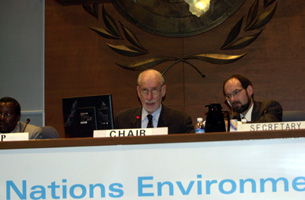 President Anderson reminded participants that UNEP Governing Council Decision 21/21 had established the IGM to strengthen IEG. He said the IGM had been mandated to report to the next special session of the GMEF GC, which will conduct an in-depth evaluation of IEG and come to a decision to be conveyed to the WSSD preparatory process. |
|
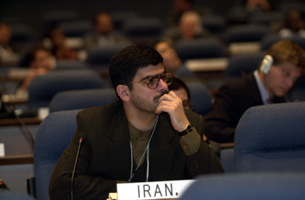 Iran (left), on behalf of the G-77/China, the EU and the US thanked the Canadian hosts, President Anderson and the Secretariat. |
|
|
President Anderson drew
the IGM-4 meeting to a close on Saturday, 1 December, at 6:00 pm
|
|
|
|
|
|
|
| © 2001, IISD. All rights reserved. |
|


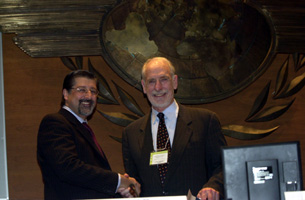 On
the final day of the
On
the final day of the


